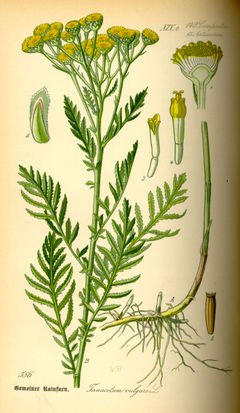Tansy
2007 Schools Wikipedia Selection. Related subjects: Plants
| iTansy | ||||||||||||||
|---|---|---|---|---|---|---|---|---|---|---|---|---|---|---|
 |
||||||||||||||
| Scientific classification | ||||||||||||||
|
||||||||||||||
|
|
||||||||||||||
| Tanacetum vulgare L. |
The Tansy or Common Tansy (Tanacetum vulgare) is a perennial herbaceous flowering plant of the aster family that is native to temperate Europe and Asia. It has also become established as an invasive wild plant in other parts of the world. In at least four states of the United States (Colorado, Montana, Washington, and Wyoming ) it has been declared a noxious weed and made illegal to cultivate.
It is a flower herb with finely divided compound leaves and yellow, buttonlike flowers. It has a stout, somewhat reddish, erect stem, usually smooth, 50-150 cm tall, and branching near the top. The leaves are alternate, 10-15 cm long and are pinnately lobed, divided almost to the centre into about seven pairs of segments or lobes which are again divided into smaller lobes having saw-toothed edges, thus giving the leaf a somewhat fernlike appearance. The roundish, flat-topped, buttonlike, yellow flower heads are produced in terminal clusters from mid to late summer. The scent is similar to that of camphor with hints of rosemary. The leaves and flowers are said to be poisonous if consumed in large quantities.
The plant's volatile oil is high in thujone, a substance found in absinthe that can cause convulsions.
Tansy was formerly used as a flavouring for puddings and omelets, but that is almost unknown now. But they were certainly relished in days gone by, for Gerarde speaks of them as "pleasant in taste", and he recommends tansy sweetmeats as "an especial thing against the gout, if every day for a certain space a reasonable quantitie thereof be eaten fasting". According to liquor historian A. J. Baime's book Big Shots, bourbon magnate Jack Daniel enjoyed drinking his bourbon with sugar and crushed tansy leaf. It has also been used as a medicinal herb. Bitter tea made with the blossoms of T. vulgare has been effectively used for centuries as an anthelmintic (vermifuge). Note that only T. vulgare is used in medicinal preparations; all species of tansy are toxic, and an overdose can be fatal. As a natural insect repellent, it was often planted next to kitchen doors to keep ants out. Some insects, notably the tansy beetle, have evolved resistance to tansy and live almost exclusively on it.
Other common names include Bitter button, Cow bitter, Golden button, and Mugwort.
A portion of a nineteenth-century poem by John Clare describes the delight of tansy and other herbs:
And where the marjoram once, and sage, and rue,
And balm, and mint, with curl'd-leaf parsley grew,
And double marigolds, and silver thyme,
And pumpkins 'neath the window climb;
And where I often, when a child, for hours
Tried through the pales to get the tempting flowers,
As lady's laces, everlasting peas,
True-love-lies-bleeding, with the hearts-at-ease,
And golden rods, and tansy running high,
That o'er the pale-tops smiled on passers-by.
From "The Cross Roads; or, The Haymaker's Story", available from a collection at Project Gutenberg.
Tansy is now being used as a girls name in the UK
